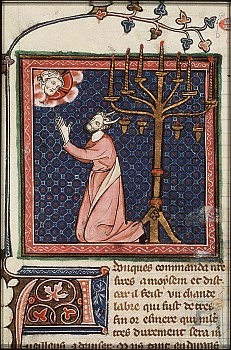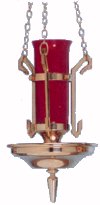Skip to comments.
The Sacraments - Fundamentals of the Faith
Insight Scoop ^
| July 23, 2009
| Peter Kreeft
Posted on 07/23/2009 10:58:21 AM PDT by NYer
click here to read article
Navigation: use the links below to view more comments.
first 1-20, 21-23 next last
1
posted on
07/23/2009 10:58:22 AM PDT
by
NYer
To: Salvation; narses; SMEDLEYBUTLER; redhead; Notwithstanding; nickcarraway; Romulus; ...
Fire
|
 Leviticus 6:12-13 "And the fire on the altar shall always burn, and the priest shall feed it, putting wood on it every day in the morning, and laying on the holocaust, shall burn thereupon the fat of the peace offerings. This is the perpetual fire which shall never go out on the altar."
The light of fire, penetrating darkness, is a symbol for the Trinity and for the grace or Person of Christ, in particular. He is "the Light of the world," as St. John tells us, and "in Him there is no darkness." While the light of fire illumines, the heat of it warms us -- and purifies. 1 Corinthians 3:13-15 tells us that fire will reveal and try our works, burning up the traces of those that can't enter Heaven (Revelation 21:27). This fire of God's love, baptizing us, illuminating, warming, and purging us, manifested before Moses in the burning bush and at the Pentecost when tongues of flame appeared over the Apostles' heads. It is in part because of the obvious symbolism grounded in these accounts that candles and lamps have been used in Christian liturgy from the beginning. Their use, though, isn't only symbolic; it is rooted thousands of years ago in the Old Testament.
The Tabernacle Lamp
(or "Sanctuary Lamp" or "Altar Lamp")
 In Catholic churches, at least one tabernacle lamp burns eternally outside the tabernacle where the Eucharist is kept, signifying the divine presence of God just as the ner tamid burned outside the tabernacle, signifying the presence of God in the Holy of Holies during Old Testament times: In Catholic churches, at least one tabernacle lamp burns eternally outside the tabernacle where the Eucharist is kept, signifying the divine presence of God just as the ner tamid burned outside the tabernacle, signifying the presence of God in the Holy of Holies during Old Testament times:
Exodus 27:19-20
All the vessels of the tabernacle for all uses and ceremonies, and the pins both of it and of the court, thou shalt make of brass. Command the children of Israel that they bring thee the purest oil of the olives, and beaten with a pestle: that a lamp may burn always,
The tabernacle lamp is usually a light that hangs down from the ceiling, encased in a red globe. It is often called a "sanctuary lamp" because, barring extraordinary circumstances, such as in an historic cathedral with lots of tourist traffic, the tabernacle is to be kept near the Altar, in a prominent, honored, and well-decorated place, in the sanctuary.
|
2
posted on
07/23/2009 11:00:25 AM PDT
by
NYer
("One Who Prays Is Not Afraid; One Who Prays Is Never Alone"- Benedict XVI)
To: NYer
Protestants don't see why Catholics who come to disagree with essential teachings of the Church don't just leave. It's so the leftists can say they have "the Catholic vote."
3
posted on
07/23/2009 11:07:05 AM PDT
by
the invisib1e hand
(The revolution IS being televised.)
To: NYer
Interesting portrayal of Moses with horns on his head.
You see it a lot in medieval iconography. Michaelangelo also portrayed Moses with horns.

It's because a single Hebrew word in Exodus 34 can mean either "horns" - its actual primary meaning - or "rays", as in "rays of light". Which was what was meant in context.
4
posted on
07/23/2009 11:12:49 AM PDT
by
AnAmericanMother
(Ministrix of ye Chasse, TTGC Ladies' Auxiliary (recess appointment))
To: NYer
for it is the Incarnation, the continuation of the Incarnation. One has to be a little careful of not getting carried away here. The eucharist is not the Incarnation. It is true that the Incarnation can be thought of as like a "super sacrament" when one ponders the ways in which God has chosen to relate to his creatures. But the eucharist is an anamnesis - a re-presentation before God of the salvific acts of Jesus. It would perhaps be more precise to say that it is a continuation of the effects of the Incarnation in a particular place at a particular time, though it doesn't sound as poetic.
To: NYer
Lutherans also believe in Christ’s real physical presence in the Sacrament—”in, with, and under” the visible elements of bread and wine. The Sacrament is one of the means by which the Holy Spirit delivers Christ and His forgiveness.
6
posted on
07/23/2009 11:29:33 AM PDT
by
Hackle
To: NYer
“In fact, the world is a sacrament.”
A very odd remark indeed, NYer, especially since the world/creation itself is distorted by man’s sin. But no matter, this is an excellent article and comments like this more than make up for any convert oddity
“The real presence of Christ in the Eucharist is a magnet drawing lost sheep home and keeping would-be strays from the deathly snows outside.”
Wonderful!
7
posted on
07/23/2009 11:35:28 AM PDT
by
Kolokotronis
(Christ is Risen, and you, o death, are annihilated!)
To: NYer
8
posted on
07/23/2009 12:49:10 PM PDT
by
TASMANIANRED
(TAZ:Untamed, Unpredictable, Uninhibited.)
To: Hackle; Mr. Lucky
Lutherans also believe in Christ’s real physical presence in the Sacrament ... I came across the following, earlier today. Perhaps someone can expound on it.
Catholics believe that the body of christ is revealed to us by the method of transubstantiation. This term refers to the bread and wine changing from one substance into another- bread to body and blood to wine. Lutherans rejects such teachings while still believing that Christ's body and blood are nonetheless truly present.
Differences between Catholics and Lutherans
9
posted on
07/23/2009 1:42:14 PM PDT
by
NYer
("One Who Prays Is Not Afraid; One Who Prays Is Never Alone"- Benedict XVI)
To: AnAmericanMother
Interesting portrayal of Moses with horns on his head. Thank you for the excellent explanation. Many years ago, I had the opportunity to see that work of Michelangelo. He is one of my most favorite artists. His David is so relistic that one expects to see blood pulsing through the veins.
10
posted on
07/23/2009 1:46:24 PM PDT
by
NYer
("One Who Prays Is Not Afraid; One Who Prays Is Never Alone"- Benedict XVI)
To: Kolokotronis
“In fact, the world is a sacrament.”One of the meanings we give to "sacrament" is "that which makes the invisible, visible." That's a stretch on the base meaning, obviously, but in that sense we say that Christ is the "sacrament" of the invisible God, that the Church is the "sacrament" of Christ, making the invisible, visible.
So, in that sense, one might say the world is a "sacrament," in that it is a visible, though imperfect, representation of the will of God the Creator.
11
posted on
07/23/2009 2:37:26 PM PDT
by
Tax-chick
(Catz bites can be nasti.)
To: NYer
The orthodox Lutheran belief is sometimes referred to as "consubstantiation", although that term is rejected by Lutherans.
Lutherans believe that the Body and Blood of our Savior Jesus Christ are truly present "in, with and under" the bread and wine. The basic statement of the Lutheran Confession in this regard is found at Article X of the Augsburg Confession:
"Of the Lord's Supper, they teach that the Body and Blood of Christ are truly present and are distributed to those who eat the Supper of the Lord; and they reject those who teach otherwise.".
To: Tax-chick
Additionally, the concept of the Church as sacrament has the same issue as the concept of the world as sacrament: the Church, as it appears on earth, is an imperfect representation of the Lord Jesus, because I’m in it, among other stout Southern ladies with a bit of a drinking problem and a tendency to shout “Bleeping FReep!”
Well, maybe I’m the only one to use such expletive ...
13
posted on
07/23/2009 3:15:01 PM PDT
by
Tax-chick
(Catz bites can be nasti.)
To: Mr. Lucky
Do you have a link to the text of the Lutheran liturgy, especially the consecration?
14
posted on
07/23/2009 4:30:50 PM PDT
by
NYer
("One Who Prays Is Not Afraid; One Who Prays Is Never Alone"- Benedict XVI)
To: NYer
From the Divine Service, setting three, Lutheran Service Book (Concordia Publishing House), pg. 197:
“Our Lord Jesus Christ, on the night when He was betrayed, took bread, and when He had given thanks, He broke it and gave it to His disciples and said: ‘Take, eat; this is My body, which is given for you. This do in remembrance of Me.’ In the same way also He took the cup after supper, and when He had given thanks, He gave it to them, saying: ‘Drink of it, all of you; this cup is the new testament in My blood, which is shed for you for the forgiveness of sins. This do, as often as you drink it, in remembrance of Me.’”
15
posted on
07/23/2009 7:17:33 PM PDT
by
Hackle
To: NYer
16
posted on
07/23/2009 8:10:20 PM PDT
by
Salvation
(With God all things are possible.)
To: NYer; Charles Henrickson
If Pastor Henrickson is awake, he might be able to help.
To: NYer
I do not know how meaningful the tabernacle lamp is for others, but my parish located the tabernacle in a glassed corner that can be seen from the highway that passes behind the altar.
It is my habit, when alone, to make the sign of the cross in thanks for his presence whenever I pass by on that highway.
I like to think the light of the tabernacle lamp falling on my eye is the Lord’s nod to my little expression of love, and it just makes me feel joyful.
18
posted on
07/23/2009 9:00:13 PM PDT
by
papertyger
(A difference that makes no difference is no difference)
To: NYer; informavoracious; larose; RJR_fan; Prospero; Conservative Vermont Vet; ...
NYer, thank you again for your wonderful work spreading the truth about the Truth.
19
posted on
07/23/2009 9:06:03 PM PDT
by
narses
(http://www.theobamadisaster.com/)
To: NYer
I really appreciate Peter Kreeft and his work. His observation of the upheaval that takes place in the life of the Catholic convert because of their new understanding of the real presence of Christ in the Eucharist is spot on. Catholic life is anchored in the Eucharist. We can pray that the sad story of 500 years of denominational schism might someday end when non-Catholics come to terms with the Scriptural and apostolic teaching and the historic Church's belief in the
real presence of Christ in the Eucharist .
Navigation: use the links below to view more comments.
first 1-20, 21-23 next last
Disclaimer:
Opinions posted on Free Republic are those of the individual
posters and do not necessarily represent the opinion of Free Republic or its
management. All materials posted herein are protected by copyright law and the
exemption for fair use of copyrighted works.
FreeRepublic.com is powered by software copyright 2000-2008 John Robinson

 In Catholic churches, at least one tabernacle lamp burns eternally outside the tabernacle where the Eucharist is kept, signifying the divine presence of God just as the ner tamid burned outside the tabernacle, signifying the presence of God in the Holy of Holies during Old Testament times:
In Catholic churches, at least one tabernacle lamp burns eternally outside the tabernacle where the Eucharist is kept, signifying the divine presence of God just as the ner tamid burned outside the tabernacle, signifying the presence of God in the Holy of Holies during Old Testament times: 